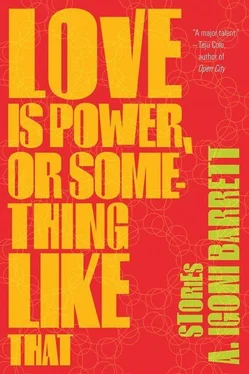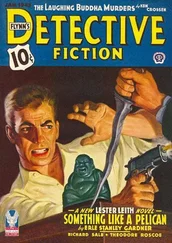
The walk from the bus stop to the gate of her daughter’s house took seventeen minutes, and Ma Bille was puffing, her forehead dappled with sweat, when the gateman opened to her knock. Alaba lived in GRA — Government Reserved Area, a high-class neighborhood with middle-class antecedents — on a tree-lined street called Springfield Avenue. Her white-stuccoed, villa-style house stood amid a forest of cycads and conifers. The wall around the house was as high as a battleship and it was topped with strings of electrified wire. The winding, gravel-paved driveway that led to the front porch was bordered on both sides by manicured azalea bushes. When Ma Bille stepped onto the porch, the scent from the flowerpots that swung from the ceiling, that hung from the fluted pillars, that lined the floor and balustrade like squat terracotta sentinels with headdresses of vibrant color, made her sneeze.
Ma Bille pressed the doorbell and waited for the housemaid to open for her. A key rattled in the lock, the steel-armored door inched open, and a face appeared. “Alaba!” Ma Bille exclaimed, throwing up her arms.
“Welcome, Ma,” Alaba said. She spoke in a low, tired voice, and her face, underneath its bright makeup, was gloomy. She wore a red silk blouse and tight blue jeans. Her nubuck leather waist belt — which was studded with mother-of-pearl, as were her red thong sandals — cinched her blouse over her belly. Her gold-streaked braids were gathered in a ponytail, her fingers and toes were garish with blue nail polish, and around her neck hung a gold necklace dangling a heart-shaped ruby in the cleave of her breasts. As she pushed the door wide and stepped aside for her mother to pass, a blast of eau de cologne wafted through the doorway.
“Where’s Tokini? Why are you not at the boutique? What happened?” Ma Bille asked in a rush, and peered into her daughter’s face. Alaba did not reply until the door closed.
“It’s a long story.”
Ma Bille followed her daughter into the high-ceilinged lounge, then sat down in the white leather armchair closest to the French window and jiggled her knees while Alaba headed to the kitchen to fetch some drinking water. As Ma Bille drank, she kept her eyes on Alaba’s face, but her gaze clouded over when the cold water stuck in her throat. She choked and spluttered, and beat her chest with her hand. She took a deep breath, ducked her head, and dabbed her eyes with the edge of her wrapper, then straightened and set down the glass.
“Tell me before I die of fear. What has happened?”
With an impassive voice, Alaba said that the housemaid had been dismissed.
“Why?” Ma Bille asked.
“I found out she was pregnant.”
“What!”
“I’ve suspected it for some time, she’s been acting funny. But when she was cleaning fish two nights ago she threw up in the kitchen, so I confronted her.”
“But how, who. . no! ”
“Yes, Ma, it was him.”
“Ah! Amos has killed me! Where is he? Let me talk to him!”
“I kicked him out with Tokini. He must fix that problem before he sets foot in this house again. When a man can’t keep it in his pants, this is the disgrace.”
“But, Alaba, the kidnappers. .”
“Serves him right if they get him,” Alaba said. “Good riddance to bad rubbish.”
“Don’t say that. Don’t say something you’ll regret later. What he did was wrong, but he’s still your husband. Call him. Let him come back. Let’s look for a way to solve this.”
Alaba’s eyes glistened, her nostrils flared, her lips curled in a snarl, she gripped her knees and leaned forward. “No, no, no, Ma, hundred times no! After seven children, what more does that man want from me? I’ve not even told you — I’m pregnant again. The few months he’s spent at home, he’s impregnated me and the house girl together! So all the time he’s away, what has he been doing? How many of his bastards are running around the streets?”
Ma Bille shifted her feet and rubbed her palms together. After a long pause, she said: “Please, my daughter, treat this with wisdom. You know what I always say: the worst thing to happen to you—”
Alaba cut her off. “Yes, Ma. I know what you always say.”
They relapsed into silence. The house was alive with electronic noises: the whirr and screak of the ceiling fan, the hum of the refrigerator, the sporadic clicking of the stabilizer; but it was the faraway, persistent woofing of a dog that broke into Ma Bille’s thoughts. She cocked her head, listening to the sound. Her blunt-nailed, wizened hands twitched in her lap.
“You’re thinking about them, aren’t you?”
Ma Bille looked up to find her daughter staring at her; the expression on Alaba’s face was hidden by the fog that followed Ma Bille’s gaze like a wilful shadow.
“Yes,” Ma Bille replied.
“They were just dogs.” Alaba leaned forward, so her face jumped into focus. “It was a long time ago, you should forget it. There are more important things to worry about.”
“Alaba,” Ma Bille said, holding her daughter’s gaze, “one day you will see that the only important things in this life are your memories. So leave me with my own.”
“All right,” Alaba said. She folded her arms across her belly and pursed her lips, then changed the subject. “So why did you come? You know I’m at the boutique around this time.”
“I wanted to see Amos. I was planning to wait around till you returned.”
“I hope no problem?”
“My operation is tomorrow.”
“Hah, I forgot. This eye problem even, it’s getting too much. This is the third time, isn’t it? I hope you’re not afraid?”
“No — fourth time,” Ma Bille said. “I’m not afraid. But I need someone to follow me to the hospital. I was hoping it would be Amos, but with this thing he has done, it will have to be you.”
The barking had ceased. From the treetops outside, birds twittered.
Ma Bille spoke. “All other times I’ve gone alone, so you know I wouldn’t ask if it wasn’t important. The nurses these days are not very nice, and they’re overworked anyway. It’s not that I can’t go by myself, but they’ll bandage my eyes, so I won’t see. The last time after the operation I woke up at night with a running stomach, and I stayed in that hospital bed calling for more than an hour, yet nobody came. I had to crawl out of the ward on my knees, because I kept banging my legs against the beds.”
“I’m sorry, Ma. I didn’t know it was like that.”
“It’s okay,” Ma Bille said. “Old age has its lessons too.”
“But it’s not okay!” Alaba burst out. Ma Bille stared at her in surprise, and kept on staring as Alaba shot out of the chair and paced the room, her braids swinging, her hands chopping the air, the slate-flat heels of her thong sandals slapping the terrazzo. “I mean, what will people say when they hear that my mother crawled on the hospital floor, a public hospital for that matter? That is the height of suffering — and yet you have children who can afford to send you abroad for treatment! But where is Otonye, ehn, where is that one? He just disappeared in America like a person who has no background. And see Ineba, with her fri-fri talk, like it is British accent we will eat. As for Nimi, he’s the youngest, he should be here taking care of you instead of sending all those fake Chinese bags that anybody can buy in bend-down market!”
“Alaba. .”
“No, Ma, I have to tell you my mind. It’s not fair! All of them are abroad enjoying their lives, but look at me, look at my life, look at what Amos has done to me. I can’t be the only one doing everything. Taking care of my children, taking care of my husband, taking care of my mother, going to my boutique every day because all those girls I hired are thieves! I have seven children, plus another one coming, and now Amos has gone to give my house girl belleh! Nobody can take me for granted o! I’m not a donkey that will be carrying everybody’s—”
Читать дальше


![Сьюзан Кейн - Quiet [The Power of Introverts in a World That Can't Stop Talking]](/books/33084/syuzan-kejn-quiet-the-power-of-introverts-in-a-wo-thumb.webp)










